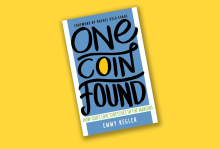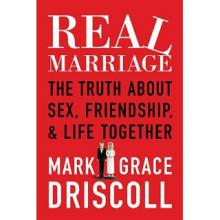There's a reason why the parables of Jesus often involved fish.
Parables

THIS IS NOT merely a survivor’s memoir; it is a grab-your-Bible-and-learn book; it is a love letter to God and the author’s queer family. In her prologue, “Lost,” Emmy Kegler sets out her agenda: “I want to tell you about the lost chapter of the Bible, the one with the story of a shepherd who leaves 99 sheep behind and goes out looking for the one that is lost. The one with the story of a woman who sweeps her entire house looking for the one coin that is lost. The one with the lost son who wanders from home and a lost son who stays and stews in his resentment and a lost father struggling to unite his broken family.”
In her first of many footnotes, Kegler identifies Luke 15:1-32 as that “lost” chapter. She spends the rest of her book conveying God’s expansive love for all who are deemed lost.
Kegler focuses on details of her story, about how bewildering it was to discover she was gay during the AIDS pandemic, in the year after Matthew Shepard’s murder. She observes, “Perhaps this is why I was fascinated by Jesus’ death: I saw the experience of my own people reflected in it.” In another chapter, Kegler recounts the pain of attending a church youth group for two years, with the leadership ultimately asking her to “pray the sinner’s prayer” when she revealed her sexual orientation.

I don’t think we like it so much when Jesus is demanding. We like to nice him up, keep him holding up his hand in that beatific way. When Jesus gets demanding, when he acts like the Gospel is demanding, it kind of gets on our nerves.

In the next few decades, a fundamental change will occur in the United States. By the year 2045, the majority of U.S. citizens will be descended from African, Asian, and Latin American ancestors, according to the U.S. Census Bureau projections. For the first time in its 240-year history, America will no longer be a white majority nation. Rather, we will have become a majority of minorities — with no one race being in the majority. The United States will be no longer a dominant white nation but a multiracial nation, which will make the assumptions of white privilege increasingly less assumed.

Most of my life, I’ve heard people preface some sort of argument they want to support with the preface, “The Bible clearly states…”
I’ve come to believe, however, that this is a phrase Christians should eliminate from their vocabulary, for a number of reasons:
- There’s no such thing as un-interpreted scripture.
Legendary preacher and theologian Fred Craddock famously noted that, even if one believes the Bible is inerrant, perfect, or directly handed to humanity from God, there’s still no way to glean an absolute understanding from the texts. After all, we all are imperfect, and as such all that we perceive flows through this imperfect vessel. The good news is that the Bible is full of imperfect vessels still being used for incredible good. So maybe rather than on absolutes, we’re meant to focus more on growth, improvement, and restoration.
- We can use the Bible to make nearly any claim we want.
Did you know “the Bible says” that if my man-jewels are squished irreparably for any reason, I’m barred from heaven (No one whose testicles are crushed or whose male organ is cut off shall enter the assembly of the Lord. Deuteronomy 23:1)? And have you considered that the Bible condones mass killing, or what some might consider genocide (Make ready to slaughter his sons for the guilt of their fathers; Lest they rise and posses the earth, and fill the breadth of the world with tyrants. Isaiah 14:21), or even infanticide (Isaiah 13:15-18)? I can use the Bible to justify slavery (wouldn’t be the first time), keeping a sexual concubine, or to prove why eating shrimp condemns me to hell.
- I’ve never met ANYONE in my life who follows the Bible completely from beginning to end.
I could swear the protesters from Westboro Baptist wear shirts that are a poly-cotton blend, and that some of the fiercest Bible-thumpers out there enjoy a good shrimp cocktail from time to time.
PREACHERS, politicians, and other public speakers know that a story is often the best way to get a point across to their listeners. In his itinerant ministry, Jesus was no exception. Some of his most important teaching was contained in stories—parables. Yet often we do not take them seriously enough to seek what he was really saying. Two thousand years of Christian theology has also obscured his original intent, often by considering them to be allegories rather than stories.
In that process, anti-Jewish stereotypes and prejudices have too often come to dominate the interpretation of the parables. Any villain is seen as representing Judaism, while the hero or victim represents the church—and, of course, in this framing God is on the side of the church. This often-unconscious bias affects how we read and understand the story and obscures Jesus’ message.
Professor Amy-Jill Levine, in Short Stories by Jesus, aims to correct that. As a Jewish New Testament scholar teaching at a Christian divinity school, she is uniquely situated to place Jesus and his teaching in their historical and cultural context. Jesus was a first-century Jew speaking to other first-century Jews. If we do not understand that starting point, we cannot understand Jesus or his stories. In an introduction not to be skipped, she points out that the parables often echo themes that appear elsewhere in Jesus’ teachings: economics, relationships, and, most important, prioritizing life in expectation of the coming kingdom of God. To make his point, he uses common, everyday examples of real-life characters and situations his audience would recognize.

It’s hard to follow through on our commitments. It’s hard to do what we know to be right.
We don’t need Jesus to remind us of all that. Most of us figured it out easily enough on our own.
What, then, does Jesus contribute to our understanding of what a well-lived life looks like? Can he help people of faith be agents of change, people who look at our fouled-up world and make differences that will benefit other people and will give voice to God’s desire for human flourishing?
A Parable and Its Surrounding Story
When we read about a parable Jesus tells concerning two sons -- one who verbally refuses his father’s command to work in a vineyard but later changes his mind and obeys, and another who agrees to toil in the vineyard but does not keep his promise -- we might be tempted to moralize it. We may assume its message is simply “Actions speak louder than words!” or “Don’t be such a hypocrite!” or “Obey your father!”
How boring.
How ineffective.
More serious: how inattentive to what’s going on at this point in the Gospel according to Matthew.
MANY PEOPLE HAVE been given a very tame and uninteresting version of Jesus. He was a nice, quiet, gentle, perhaps somewhat fragile guy on whose lap children liked to sit. He walked around in flowing robes in pastel colors, freshly washed and pressed, holding a small sheep in one arm and raising the other as if hailing a taxi. Or he was like an “x” or “n”—an abstract part of a mathematical equation, not important primarily because of what he said or how he lived, but only because he filled a role in a cosmic calculus of damnation and forgiveness.
The real Jesus was far more complex and interesting than any of these caricatures. And nowhere was he more defiant, subversive, courageous, and creative than when he took the language of fire and brimstone from his greatest critics and used it for a very different purpose.
The idea of hell entered Jewish thought rather late. In Jesus’ day, as in our own, more traditional Jews—especially those of the Sadducee party—had little to say about the afterlife, about miracles, about angels and the like. Their focus was on this life and on how to be good, just, and successful human beings within it. More liberal Jews—especially of the Pharisee party—had welcomed ideas on the afterlife from neighboring cultures and religions, especially the Persians.
To the north and east in Mesopotamia, people believed that the souls of the dead migrated to an underworld whose geography resembled an ancient walled city. Good and evil, high-born and lowly, all descended to this shadowy, scary, dark, inescapable realm. For the Egyptians to the south, the newly departed faced a ritual trial of judgment. Bad people who failed the test were then devoured by a crocodile-headed deity, and good people who passed the test settled in the land beyond the sunset.

Our distaste for people who cut in line remains unchanged as we grow up. Whether someone gets to the front of the lunch line or the airport security check before us in an unfair way, our annoyance is raised. People who steal our parking spots during the Christmas season are the recipients of our worst thoughts. We might — just might — yell a string of expletives and death threats at anyone who has wronged us on the road or in a parking lot.
It’s not just about being orderly and following the rules. Instead, we rue the flouting of justice and fairness. I have been waiting patiently in line; what gives you the right to deem yourself better than me?
Yet if we’re honest, we will quickly realize that such outrageous reactions to outrageous behavior are no better than the line cutter or parking space thief. Moreover, our sense of injustice is quite attuned to moments of personal grievance even as we neglect how our actions may harm others. If anything, these moments of rage reveal much more about us than those we think have aggrieved us.

HE SAID: David Vanderveen
Real marriages develop from two people who are committed to making them work. The specifics of how two real people make one real marriage work is largely irrelevant given the freedom we have in Christ. Marriage is supposed to be a symbol of our relationship with God on earth.
We don’t need more multiple choice tests and true-and-false quizzes with black-and-white answers to bring heaven to earth; we need to put the love of the other first — with God at the core — to make our marriages work.
SHE SAID: Sarah Vanderveen
Real Marriage is a poorly written, poorly researched book by a well-meaning pastor who I believe is struggling with his own sexuality and sense of self-worth. I don’t know how else to explain his weirdly inappropriate fixation on masculinity and specific sexual practices, and his failure to address the complexity of human sexuality and relationships.
It feels to me like he doesn’t really want to understand the whole person, rather he just wants to cut straight to the salacious tidbits. I realize that’s how you sell a lot of books, but still. I get the distinct impression that Driscoll is not a man at peace.
He put before them another parable: "The kingdom of heaven is like a mustard seed that someone took and sowed in his field; it is the smallest of all the seeds, but when it has grown it is the greatest of shrubs and becomes a tree, so that the birds of the air come and make nests in its branches." He told them another parable: "The kingdom of heaven is like yeast that a woman took and mixed in with three measures of flour until all of it was leavened."
The kingdom of heaven is like treasure hidden in a field, which someone found and hid; then in his joy he goes and sells all that he has and buys that field. Again, the kingdom of heaven is like a merchant in search of fine pearls; on finding one pearl of great value, he went and sold all that he had and bought it.
--Excerpts from Matthew 13
It's been a rough weekend. Watching the devastation that the combination of mental illness and fundamentalism brought to the people of Norway. Watching what the combination of drug addiction and fame brought to a talented singer, who, like so many who went before her, is now dead at the age of 27. Something they don't tell you when you get clean and sober is that if, by the grace of God, you manage to stay that way -- you get a much better life -- but year after year you also watch people you love die of the same disease. So yesterday when I heard that Amy Winehouse had been found dead in her home, it brought me back to nine years ago when my dear friend PJ was also found dead in his home.


So as I watched the final Hogwarts Express depart from Platform 9¾ in Harry Potter and the Deathly Hallows, Part II this past weekend (slightly teary-eyed, I confess), I started to wonder: What might it sound like to pray in the language of Harry Potter -- language that clearly resonates with folks around the world? Would it be cheesy? Probably. Profane? Perhaps. But I figured the God who relied on earthly parables about wineskins and fig trees to explain the Kingdom would understand.
As friends and I met for dinner to enjoy pictures of mutual friends' wedding, their four-year old joined in the fun.

But the house and the occupant do share one commonality: they both will someday cease to be. Both will pass away. The occupant, who was not the house, will die; and the house, who was not the occupant, will burn down or molder down or be torn down or undergo some other such ending. All will be gone. All the pieces and parts of our lovely story gone into dust and ashes. All of them gone as pieces, anyway.
What is and always will be is what neither the house nor the occupant, as separate entities, ever was. What is and is ever to be is home — the joy-giving, rest-filled, and light-bearing presence within experience of the reality of "home." What is, is the translation of passing tangibles into the eternal. What is, is the fusing of occupant and house into one that is neither, but both together. What is, is a story about an occupant and a house that, in truth, is really a story resurrection bodies and the kingdom of God, as in "Thy Kingdom come, Thy will be done on earth as in Heaven."
